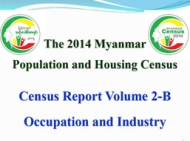Presentation on The Union Report: Occupation and Industry
By The United Nations Population Fund • March 28, 2016 The most recent census in Myanmar was undertaken in 2014. The census employed a de facto methodology where, with some exceptions, individuals were enumerated at the place they were residing on the 29th of March 2014 (Census Night). This census was undertaken after more than three decades; the last censuses were conducted in 1983 and 1973. In addition to providing benchmark data on demographic and socioeconomic characteristics of the population and households, censuses are unique sources of information for small geographical areas. Such disaggregated information is vital for planning and decision-making at Union and sub-national levels. Additional data uses include decisions in the allocation of resources during the national budget process; the review of administrative and political boundaries; and the positioning of social infrastructures such as schools, health facilities and roads. The census also provides data to monitor
The most recent census in Myanmar was undertaken in 2014. The census employed a de facto methodology where, with some exceptions, individuals were enumerated at the place they were residing on the 29th of March 2014 (Census Night). This census was undertaken after more than three decades; the last censuses were conducted in 1983 and 1973. In addition to providing benchmark data on demographic and socioeconomic characteristics of the population and households, censuses are unique sources of information for small geographical areas. Such disaggregated information is vital for planning and decision-making at Union and sub-national levels. Additional data uses include decisions in the allocation of resources during the national budget process; the review of administrative and political boundaries; and the positioning of social infrastructures such as schools, health facilities and roads. The census also provides data to monitor
and report on national and international development commitments, including national development plans, the Sustainable Development Goals (SDGs), and the International Conference on Population and Development Programme of Action (ICPD-PoA), among others.
Download the full report in English here.
အစီရင္ခံစာ ျမန္မာဘာသာကုိ ဤေနရာတြင္ ရယူႏိုင္သည္။
Tags: ASEAN, Education, Ethnic Nationalities, Human Rights, The United Nations Population FundThis post is in: ASEAN, Children and Youth, Economy, Ethnic Nationalities, Health, Law, Women
Related PostsBurma Partnership Celebrates Continuing Regional Solidarity for Burma and Embraces the Work Ahead for Progressive Voice
Myanmar’s New Dawn :Opportunities for Aung San Suu Kyi and U.S.-Myanmar Relations
Expanding People’ Solidarity for a Just and Inclusive ASEAN Community
Civil society launches #FreeThe5KH campaign in support of the imprisoned ADHOC staff and NEC official
Myanmar logging ban a major step to forest sector reform









 All posts
All posts